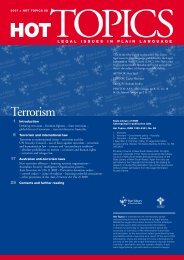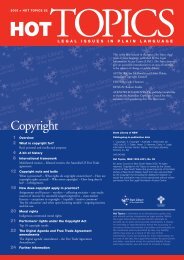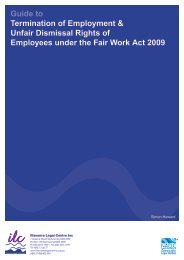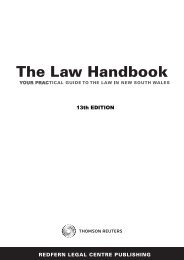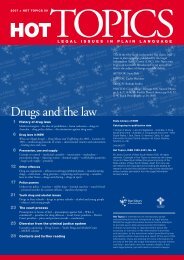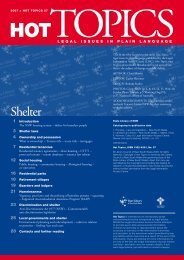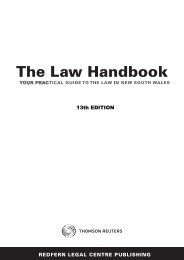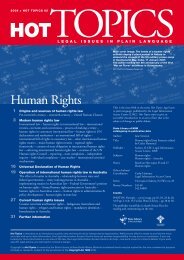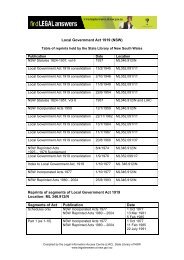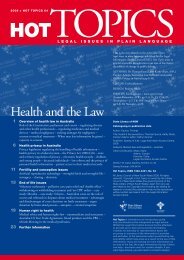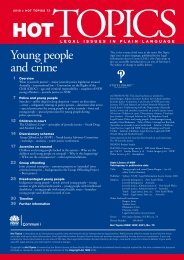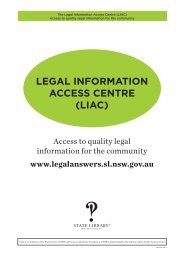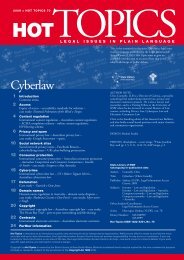Consumers | The law handbook - Legal Information Access Centre
Consumers | The law handbook - Legal Information Access Centre
Consumers | The law handbook - Legal Information Access Centre
- No tags were found...
Create successful ePaper yourself
Turn your PDF publications into a flip-book with our unique Google optimized e-Paper software.
358 <strong>The</strong> Law Handbookwhere they are contractually obliged to doso, proceedings can be brought by theconsumer against the warranty provider forbreach of any relevant consumer protectionprovision contained in the Competition andConsumer Act or breach of contract, in theNSW Civil and Administrative Tribunal.[11.170] Sales on consignmentA particular problem emerged in the early1980s. People wishing to sell their vehicles,rather than trade them in, would hand themto someone to sell for them on consignment.<strong>The</strong> vehicle would be delivered and commonlya signed transfer handed over. Often,there would be no written agreement recordingthe terms of the arrangement, andin particular, there would be no writtenrecord of the minimum price at which thevehicle was to be sold. Disputes would arisewhen the owner of the car received less thanthe sum expected. In several instances, theconsignee became bankrupt before the monieswere paid to the consignor.In 1985, Pt 4A was introduced into theMotor Dealers Act. It required a dealer whosold on consignment to open a trust accountinto which purchase monies were to be paid,no later than the next day upon which abank was open. Money could only bewithdrawn from that account to pay theconsignor of the vehicle, to pay any debtproperly payable by the assignor to thedealer, or to pay any other amount permittedby the regulations. <strong>The</strong> account wassubject to audit. Finally, there were somedisciplinary provisions for breach. Such provisionsare also contained in Pt 4 Division 6of the Motor Dealers and Repairers Act 2013(not yet in force).While these amendments did not addressmany of the issues which had arisen, theydid provide security for the monies received.A person who wishes to proceed to sell avehicle on consignment should make surethat all details such as the minimum saleprice, and the fee to be paid, are recorded inwriting and signed by the consignee.[11.180] Lawyers<strong>The</strong>re is a very detailed scheme under the<strong>Legal</strong> Profession Act 2004 (NSW) to protectclients of <strong>law</strong>yers. A <strong>law</strong>yer is required toprovide to a client the best estimate of feesthen able to be made, and details of the ratesof fees charged by the <strong>law</strong>yer for particularitems of service. <strong>The</strong> client also must begiven information on the right to negotiatefees, to receive a detailed bill, and to beadvised of any substantial change in theestimate and rates. <strong>The</strong>re is a range of otherdetailed advice which must be provided,including the rate of interest charged onunpaid accounts, and the intervals at whichbills will be presented for payment. <strong>The</strong>client must also be informed of the right toseek an assessment of any bill. If thisinformation is not provided, any fees recoverablewill be calculated by reference towhat an assessor considers to be a reasonablerate, which may not be the rate usuallycharged by the <strong>law</strong>yer. In addition, anassessor may reduce the sum payable becauseof the seriousness of any failure.A client must receive a detailed bill ofcosts before the <strong>law</strong>yer may recover money.If a client considers that the fees areexcessive, a request may be made for thecosts to be assessed by an independentassessor. Before that process is undertaken,there may be a referral to mediation. <strong>The</strong>Act contains provisions for appeal.If a <strong>law</strong>yer receives money on trust for aclient, the strict accounting provisions of theAct apply. A <strong>law</strong>yer receiving trust moneymust operate a trust account and all trustmonies are to be paid into that account.Only withdrawals authorised by a client ordirected by a court may be made from thetrust account. Withdrawals for this purposeinclude transfers from the trust account tothe general account for fees. A <strong>law</strong>yer must



